Looking to take your upper chest workout to the next level? Look no further than the incline cable fly.
The Cable Incline PEC Fly is one of the best exercises for targeting the often neglected clavicular head of the pectoralis major.
That helps to strengthen the upper body by training the chest and shoulders.
In this blog, we’ll blog we will discuss the following topics:
- What is incline cable chest fly,
- Muscle worked during incline fly
- How to do it, and pro-tips.
- Benefits of doing it
So grab your cables and get ready to pump up your pecs.
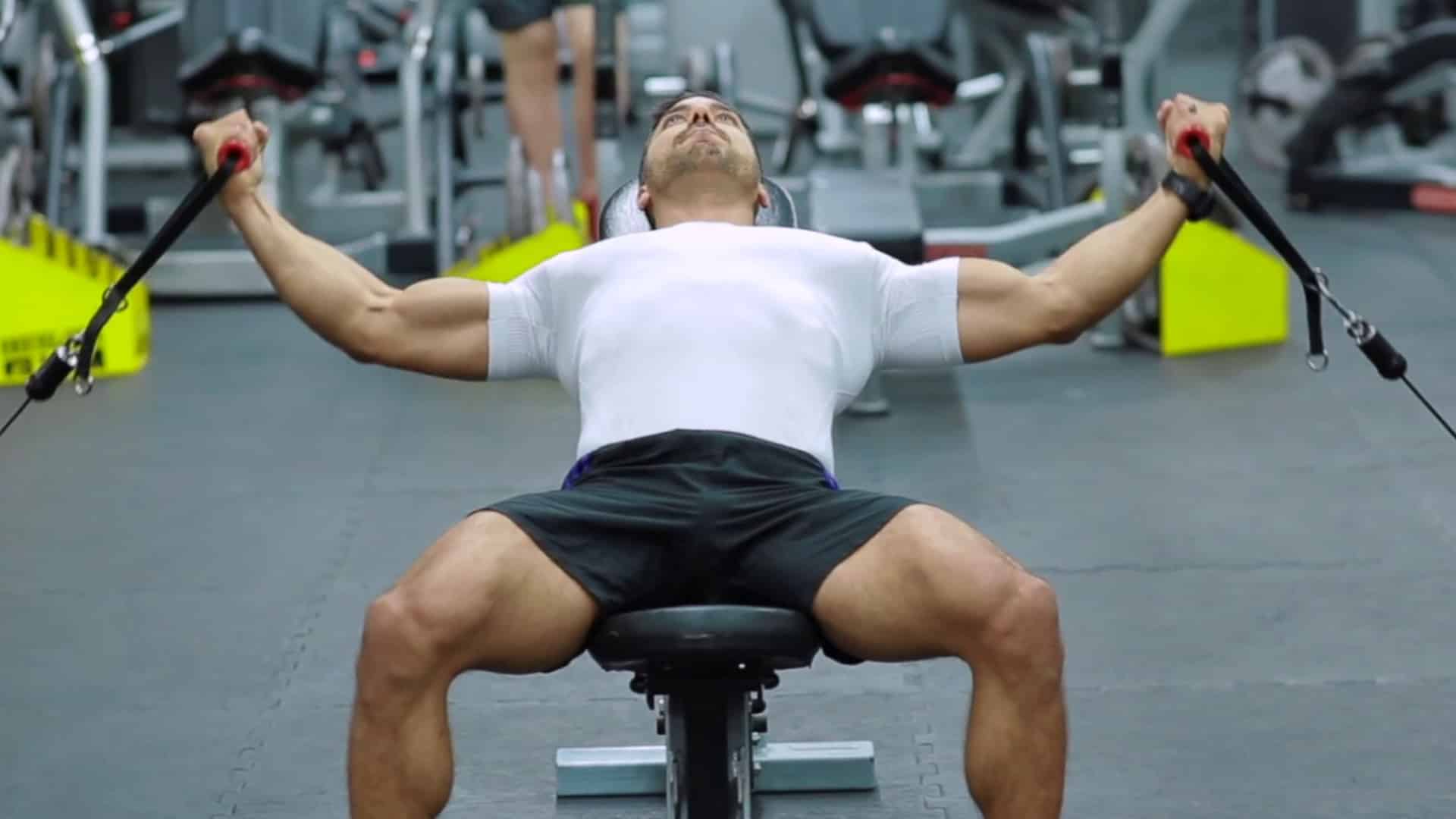
What Is Incline Cable Fly
Incline cable flyes isolate and develop the chest muscles, particularly the upper pectoral region. They also engage the shoulders and triceps for secondary support.
The incline cable fly, unlike the incline dumbbell fly, allows for constant tension, which helps build upper chest fibers.
Types of Incline Cable Flyes
- Incline Bench Cable Fly: This variation targets the upper chest while providing the stable support of an incline bench.
- Standing Incline Cable Fly: Offers a slightly greater challenge to your core and stabilizer muscles. It’s a good choice if you want to do more dynamic chest exercises.
Try doing incline cable flyes with different attachments and angles – it keeps things fun and hits your chest in new ways.
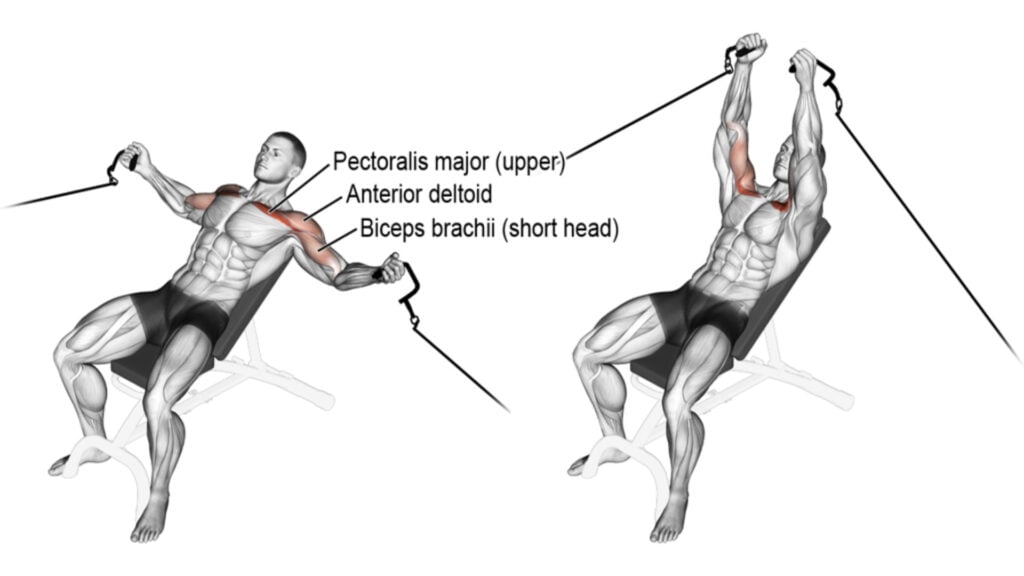
Incline Cable Fly Muscle Worked
The incline cable flys primarily muscle worked are upper pectoralis major muscles.
In addition to its target, the main pec muscle. The incline fly has the involvement of several synergist muscles, these muscles include,
- Rhomboids,
- Levator scapulae,
- Anterior deltoids, and
- Latissimus dorsi.
A handful of other muscles worked or play the role of stabilizer muscles, including your
- Biceps brachii,
- Brachialis,
- Wrist flexors,
- Obliques, and
- Rectus abdominis.
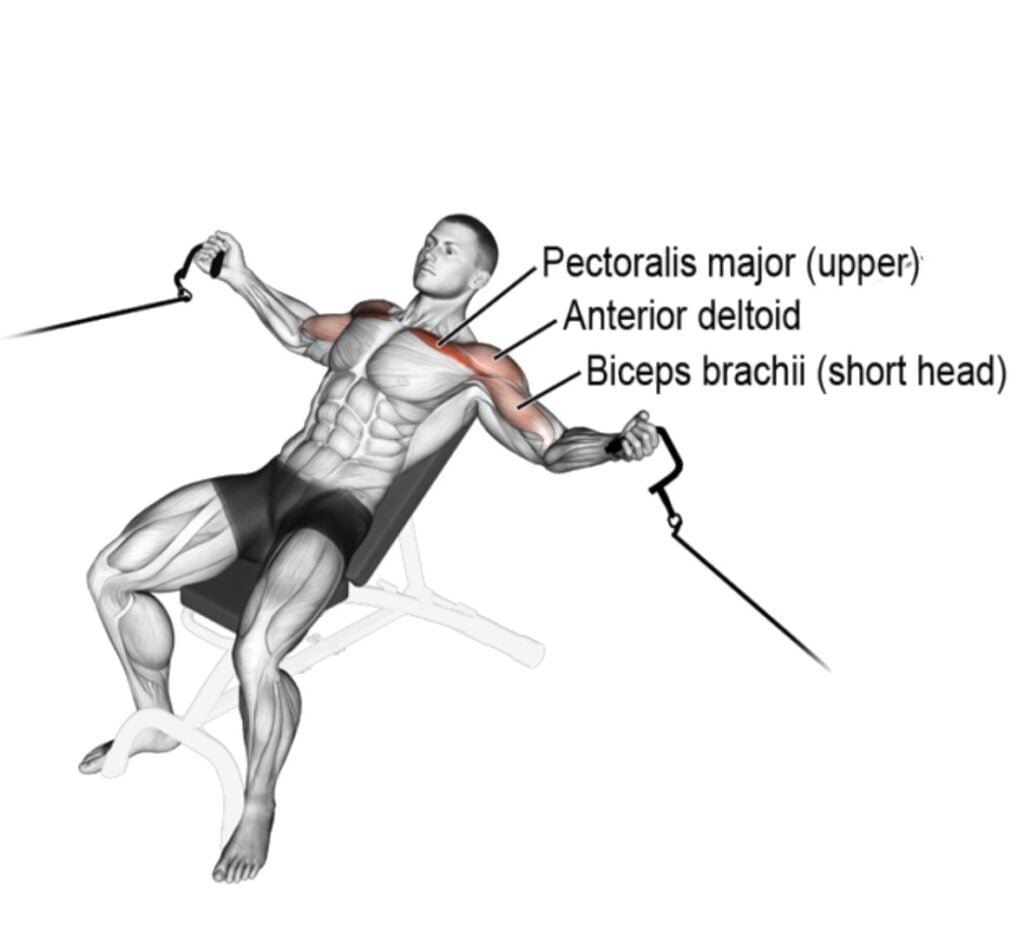
How to Do Incline Bench Cable Fly
- Set the bench at an incline angle of around 30–45 degrees.
- Ensure that the bench is stable and secure.
- Attach stirrup handles to the low pulleys and lie down on the bench with your feet flat on the floor.
- Grasp the cable handles with an overhand grip and hold them with your arms extended out in front of you.
- Your palms should be facing each other.
- Slowly lower the cable attachments outward to your sides.
- Bring your arms back toward the midline of your body.
- Do 3–4 Sets and 10–12 Sets.
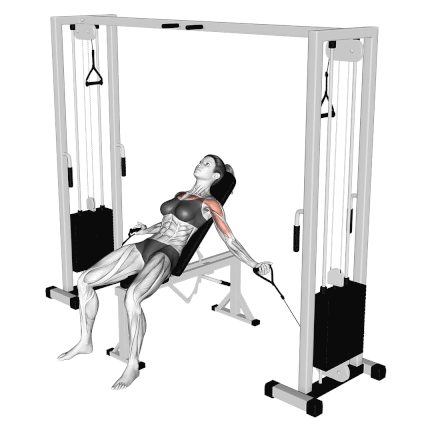
Know More: 14 Best Cable Chest Exercises And Workout Routine
Pro-Tips
- Keep your core engaged and your back flat against the bench throughout the movement.
- Use a weight that challenges you but allows you to maintain proper form.
- Exhale as you bring the handles together, and inhale as you lower them back down.
- Vary the position of the bench to hit different angles of the upper chest.
- Hold and contract the chest muscles when hands are together.
- Set the bench at about 30–45 degrees inclined. Do not go more upright as the stress shifts more to the shoulders rather than the chest area.
- Don’t let your elbows drop too far when you’re in the start position, they should remain in line with your torso.
- Pick a weight that you can control, that’s not too light or too heavy — find what’s right for you.
Standing Incline Cable Fly
The standing incline cable fly is also known as the low-to-high cable fly. The cable provides constant tension and helps to develop and define the upper and inner chest.
It provides much-needed stress for those who want to build up their chest muscles.
The study found that the most activity for the upper part of the pectoralis major muscle occurred when the bench was angled at 30 degrees.
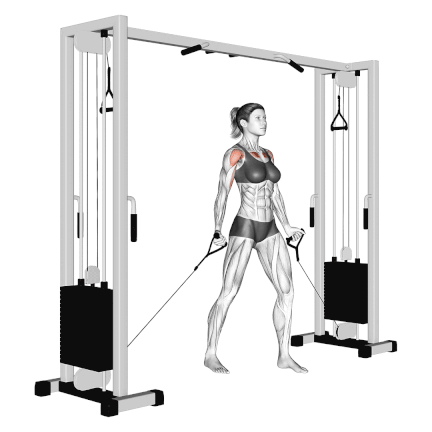
How To Do Standing Incline Cable Fly
- Adjust the cable machine pulleys to their lowest setting.
- Stand between the pulleys with a staggered stance (one foot slightly ahead of the other) for balance and stability.
- Grasp the handles with your palms up.
- Extend your arms slightly to the sides, slightly bending your elbows.
- Bring your hands together in an upward arcing motion.
- Aim for your hands to meet in front of your chest.
- At the top of the movement, briefly squeeze your chest muscles.
- Slowly reverse the movement, returning the handles to the starting position with control.
Tip
- To maintain your balance, take a staggered stance.
- Control the weight as you bring your arms back down.
- Keep a slight bend in your elbows to avoid strain on the joint.
- Exhale as you bring your hands together, and inhale as you return to the starting position.
Know More: Upper Chest Cable Exercises For Bigger & Stronger Chest
Benefits of the Cable Incline Fly
- The cable fly is a great exercise for isolating the upper chest muscles, which can help improve muscle activation and hypertrophy.
- The cable chest fly exercises are a great alternative for people who feel joint pain during the incline bench press.
- They are more evenly distributed, and you have more of a constant load on your chest muscles throughout the whole range of motion.
- The cable fly is great because it’s a nice chest opener that teaches scapular retraction.
- The cable setup gives your muscles almost uninterrupted time under tension and a huge pump — each of which can help optimize muscle growth.
- They can be performed in various ways, with different angles and attachments. This can help add variety to your chest workout and prevent boredom.
Best Alternate of Incline Cable Fly
Best alternative exercises that target the same primary muscle groups with different equipment.
- Incline Dumbbell Fly
- Decline Push Ups
- Incline Dumbbell Press
- Landmine Chest Press
- Incline Bench Dumbbell Pullover
FAQs
What angle should the incline cable fly?
The best angle range for doing incline cable flies is 30–45 degrees. This allows for effectively targeting the upper chest muscles while minimizing strain on the shoulder joints.
Do not go more upright as the stress shifts more to the shoulders rather than the chest area.
Is the incline cable fly suitable for beginners?
Yes, it is suitable for beginners if performed with proper form and a weight that allows for controlled movement.
How does the incline cable fly differ from the incline bench press?
The incline cable fly and incline bench press both target the upper chest muscles but do so in slightly different ways.
- The incline bench press involves pushing a weight away from your chest
- While the incline fly involves pulling the cables towards your chest in a fly-like motion.
Additionally, the cable fly provides a greater range of motion and a more continuous tension.
Are incline flys worth it?
Yes, incline flys can be worth it as they uniquely target the upper chest muscles, helping build strength and definition.
Incline flys work best when done properly, with the right weight, and as part of a balanced workout routine.
Takeaways
Incline cable flys are a valuable exercise for targeting the chest muscles.
Combine it with other chest exercises such as bench press, push-ups, or chest flys to complete a full chest workout routine.
Thanks for reading
Stay Fit, Live a Happy and Healthy Life

Manish is a NASM-certified fitness and nutrition coach with over 10 years of experience in weight lifting and fat loss fitness coaching. He specializes in gym-based training and has a lot of knowledge about exercise, lifting technique, biomechanics, and more.
Through “Fit Life Regime,” he generously shares the insights he’s gained over a decade in the field. His goal is to equip others with the knowledge to start their own fitness journey.
